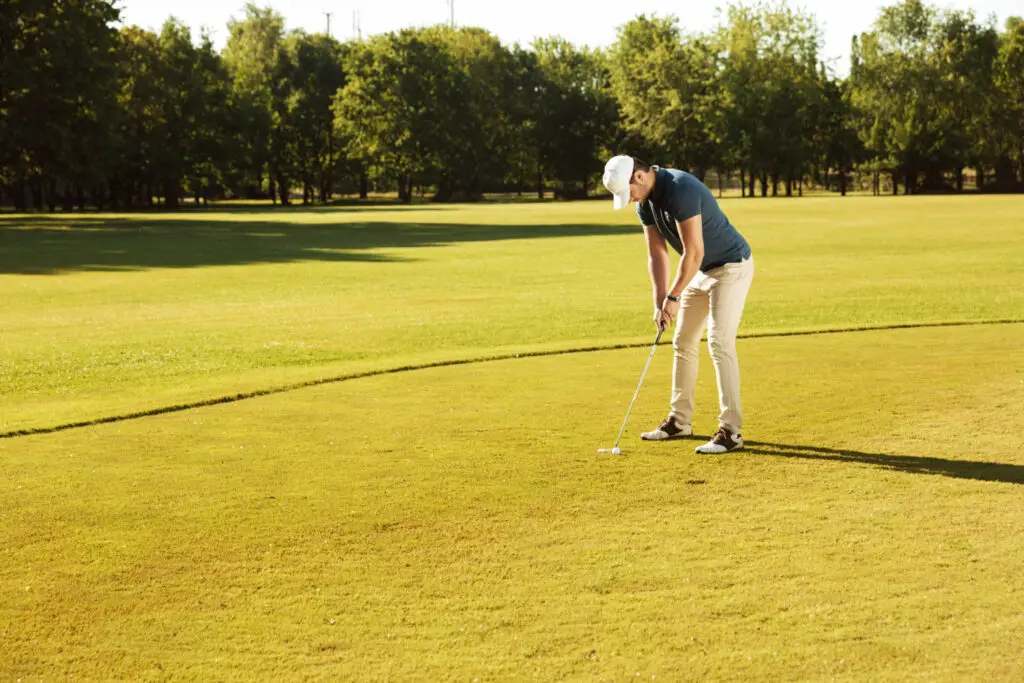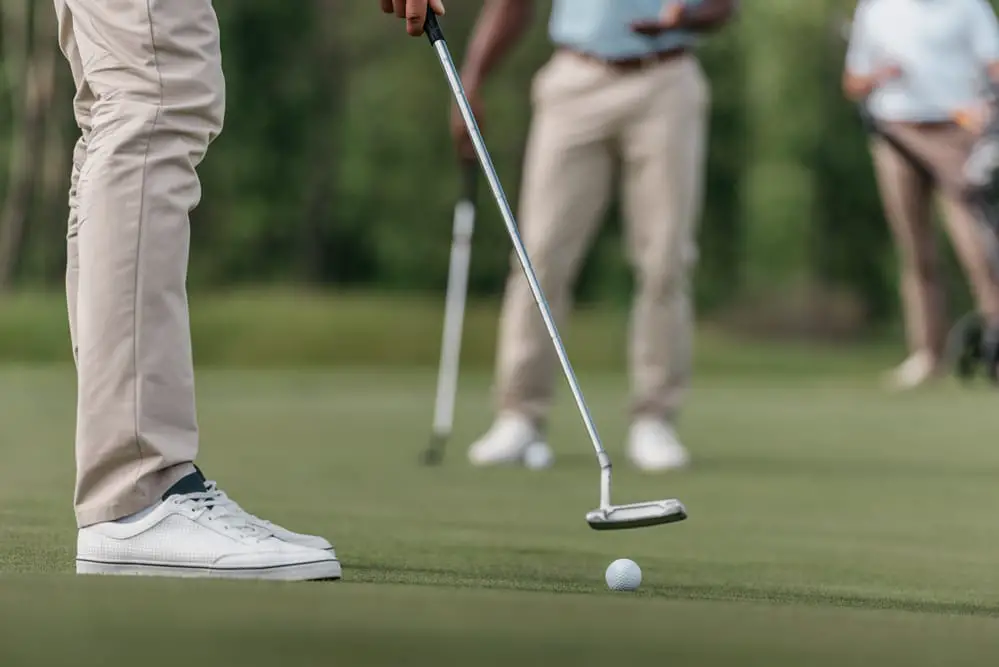Last Updated on November 8, 2023
Are you striving to become a proficient golfer but don’t have the resources or means? Don’t worry, getting good at golf doesn’t require a professional instructor. With some basic understanding of the game and commitment to practice, anyone can become an expert golfer. This blog will provide some tips on how to get good at playing golf without taking any lessons. From understanding the basics to finding the right gear and learning from others – we’ve got it all covered in our easy guide so that you can start improving your game today. Get ready to hit those fairways with confidence as we show you how simple it is to get good at golf.
Table of Contents:
- Understand the Basics
- Practice Makes Perfect
- Get the Right Gear
- Learn from Others
- FAQs in Relation to How to Get Good at Golf
- Conclusion
Understand the Basics
Golf is a game of skill and finesse, so it’s important to understand the basics before you hit the course. Here are some tips on how to get started:
Grip
The grip is one of the most important elements in golf. The hold should be snug, yet not too tight – secure and pleasant to the touch. Your left hand should be slightly lower than your right, with both hands forming an “L” shape when viewed from above. Make sure that your thumbs are pointing down towards the ground for maximum control over your club head.

Stance
Your stance will determine how well you can transfer power from your body into the ball during a swing. Place your feet shoulder-width apart and point them slightly outward away from each other at about 45 degrees. This will give you better balance throughout the swing motion. Bend forward at your hips until you feel like you have good posture—not too upright or hunched over—and keep your weight evenly distributed between both feet as much as possible throughout the entire shot process.
Swing
To make a successful golf swing, begin by taking a deep breath and focusing on the task at hand. Shift your weight onto one foot while keeping it centred underneath yourself for stability. If needed, take another deep breath before starting to move through with the actual swing itself.
Start slowly by bringing back up through waist level using only arms and shoulders while maintaining balance throughout the entire move without any abrupt stops or starts along the way. Gradually increase speed as you reach full extension just prior to impact with the ball, then follow through completely after contact has been made so that momentum carries out beyond the target area where the desired trajectory was aimed for originally – this helps ensure accuracy in shots more often than not.
Practice Makes Perfect
Repetition is critical for any golfer wishing to advance their performance. It’s important to remember that practice doesn’t just mean hitting the driving range or putting green. You can also work on your mental game, physical fitness, and even nutrition.
Start With a Plan
Before you head out to the course or practice facility, it’s best to have a plan in mind of what you want to accomplish during your session. Are you working on improving your swing? Or are you trying out new clubs? Maybe you’re focusing on mastering a particular shot? Having an idea of what needs improvement will help keep your practice focused and efficient.

Set Goals
Once you know what areas need attention, set some goals for yourself that are achievable but still challenging enough that they push you outside of your comfort zone. Ensure your objectives are quantifiable so that, come assessment time at the close of each interval, there is no uncertainty as to whether they were attained.
When practising golf shots, make sure to take note of the distance and landing point relative to the target line for each ball. Thus, with the conclusion of each session, there is a wealth of information to consider in order to discern which shots require further effort. Additionally, adjustments such as stance widths and angles can also be made mid-session if needed.
Golf is hard, so don’t expect results overnight. Take small steps towards improvement over time instead. This will give better long-term results while helping maintain motivation levels along the way too. Also, remember why we play golf in the first place – because it’s fun. So try not to let frustration get in the way too much either. Otherwise, the enjoyment factor might start to diminish quickly thereafter and make the process less enjoyable overall than intended originally.
Get the Right Gear
For beginners, a set of oversized irons and a driver are great options, as they provide more forgiveness on off-centre hits. Oversized irons have larger club heads which makes them easier to hit than traditional irons. A driver with a large head will also help you get more distance out of each shot.
When choosing golf balls, look for ones that offer good spin control and durability. Soft compression balls are best for beginners as they tend to fly farther than harder compression balls due to their low spin rate off the tee box. As you become more experienced, you may want to try different types of golf balls, such as multi-layer tour models or urethane cover models, which provide a better feel around the greens but require higher swing speeds in order to maximise performance benefits from them.

It’s also important not to forget about other accessories like gloves, tees, bags and shoes when shopping for new gear – these items can be just as important in helping improve your game. Golf gloves should fit snugly without being too tight; tees should be long enough so that most of the ball is above ground level; bags should be lightweight yet durable; and shoes should provide traction while walking on wet grassy surfaces during play.
Finally, don’t forget about custom fitting services offered by many retailers – this can help ensure that all your clubs are fitted properly based on factors such as height, arm length and swing speed in order to optimize performance results from each one. With a proper selection of equipment combined with practice and dedication, there is no limit to how far you can take your game.
Learn from Others
Golfing is an intricate game that necessitates proficiency, familiarity, and continual honing to excel at. Observing experienced golfers or getting instruction from a pro can be an effective way to enhance one’s knowledge of the game. Watching other players can help you understand the basics of golf and how they approach each shot. You can also pick up tips on their technique, such as their grip, stance, swing speed and follow-through.
Another great way to learn from others is by joining a local club or organisation where you can get together with other golfers who share similar interests in the sport. This provides an opportunity to ask questions about different techniques or strategies that have worked well for them in certain situations, which could prove beneficial when playing yourself later on down the line. Additionally, having someone else around who knows what they’re doing can help motivate you during practice rounds so that you stay focused on improving your skills instead of getting distracted by outside influences like weather conditions or course layout changes due to wind direction.
FAQs in Relation to How to Get Good at Golf
How long does it take to get good at golf?
Golf is a game that requires patience, dedication and practice to master. The time it takes to become proficient in golf varies, based on an individual’s dedication and proficiency. It can take a varying amount of time for someone to become an expert golfer, ranging from several months up to many years. For those just starting out, basic fundamentals such as grip, stance and swing mechanics should be learned first before attempting more complex shots. Additionally, regular practice sessions are essential in order to maintain progress and consistency over time. With consistent effort and determination, anyone can become a great golfer.
Can you get good at golf without lessons?
Yes, it is possible to get good at golf without lessons. With the right dedication and practice, anyone can improve their game. By studying instructional videos online or reading books about the fundamentals of golf, you can learn proper technique and form. Additionally, spending time on the range hitting balls will help develop your swing and accuracy. To improve your game, try hitting the range and playing with experienced golfers who can give you advice on how to better your skills. With enough hard work and determination, you too, can become a great golfer without taking lessons.
What does it take to be a good golfer?
To be a good golfer, you must have the ability to stay focused and maintain concentration throughout your round. You need to practice regularly, focusing on perfecting your technique as well as developing course management skills. Having a solid grasp of the regulations of golf and how they apply in various scenarios is necessary for success. Finally, it’s essential to understand how different clubs work for various shots so you can choose the right one for each situation. With these qualities combined, anyone can become a great golfer.
Conclusion
Golfing can be an enjoyable physical activity, perfect for a day of fun. With the right knowledge, practice, gear, and guidance from others, you can get good at golf without taking any lessons. Remember, the goal is to have a blast! Don’t be hesitant to experiment or take a gamble – you could discover unforeseen triumph when striving for golfing proficiency!



